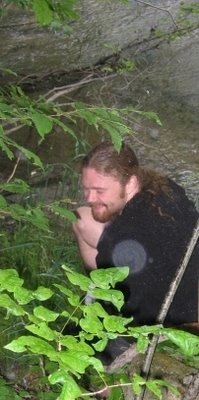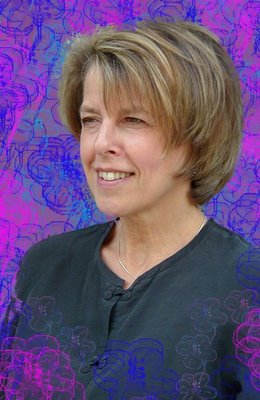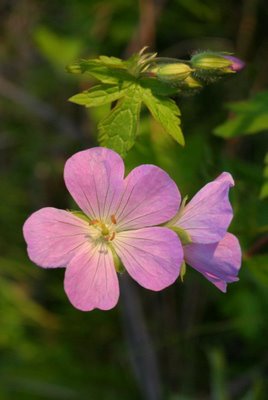 Doug Milliken at Silk Creek
Doug Milliken at Silk CreekStars in the Shape of a Broken Wing
by Douglas W. Milliken
On a rough-hewn nightstand beside her bed, my mother keeps a framed photograph of my sister Tanya when she was a young girl. The photograph has a nostalgic umbra, a blurriness that, when younger, I understood meant age in a “before you were born” sort of way. It would be years before I realized that the blurriness was not some cataract of prehistory, but a sad fact of photography: an enlargement of a much smaller print.
In the photo, my sister is kneeling and wearing a white nightgown that drapes over her like the petals of a down-turned lily. The background is black, barely suggesting form: a table, maybe, or a windowsill or counter. Tanya looks out from the picture with eyes dark and glossy with emotive calm, Biblical with serenity: alone but unafraid, a virgin in the dark.
In her cupped hands rests a wounded bird.
It’s been a long time since I last saw this picture, and though I can remember the details of my sister in her nightgown, the bird she holds in her hands is a mystery. Is it a sparrow? A dove chick fallen from its nest? Maybe. But with a certain note of repressed apprehension, a part of me screams: it’s a hummingbird.
Before most of our farm’s outbuildings were torn down, the long shed stitching the house to the garage was silently invaded and annexed by an army of barn spiders – huge and harmless, grey-bodied and bony-legged, fangs soft as soap. Mum loved their creepy lack of menace, so their arachnid kingdom remained unscathed by the threat of whisking brooms or bug-spray. But their dominion became a spatial tyranny, allowing only a narrow corridor leading through the shed from the house’s backdoor to the garage, a low cul-de-sac surrounding the deep freezer. Everywhere else, webs spanned between girders, threading the air like lace.
One afternoon, while crouching through the shed with a basket of laundry for the line, my mother heard a frantic, rustling oscillation somewhere in the clogged matrix overhead: nestled near the ceiling, entangled in gossamer, a hummingbird buzzed like a broken machine. The barn spiders had gathered to investigate the spectacle, but hadn’t yet made a move. In their webs they’d previously encountered grasshoppers, caterpillars, and thick chunks of government cheese (all courtesy of my brother and I), but never anything like this; nonplussed, they wondered what they should do.
Mum alleviated them of the task. Delicately removing the bird from its trap – careful not to harm the ensnared or the snare – Mum carried the tiny body outside to the garden, to the leaning wall of jagged stacked plate slate.
Tenderly removing the binding threads one long strand at a time – patient and gentle as if the bird was one of her own children – Mum let the warmth of the sun shift and fade over her shoulders while the hummingbird rested quietly in her hands, letting itself be saved.
Every time I think this through, I get caught up at this point in the story. The image is clear in my mind, but imprecise: I see my mother, not as the slim and healthy back-to-the-lander she was back then, but as the plump and absentminded hospice nurse she has become, body soft like a well-fed toddler, eyes and mouth set with abstract bemusement. I see an old child sitting with a small animal in her hands, taking the time to save a life so much smaller than her own, and completely – without fault – content.
Like a ripe strawberry found in the desert, I could savor this image forever.
The day had dimmed to indigo by the time the last feather was free of silk. Raising her arms away from her body, Mum watched as the hummingbird tentatively rose from the chalice of her hands, hovering sleepily then turning a slow orbit around Mum’s sitting form, wavering like a candle flame before her face, flitting off into the cooling dusk. In the fields, shamrocks were closing their folds. Frogs were creaking in far ponds. Mum fetched the laundry from inside and hung it on the line to dry.
Like the undying cat of song, the hummingbird came back the next day, trailing my mother through the garden and sipping from the unfurled bursts of tomato and borage while Mum plucked weeds from among their roots. Mum noticed its mallard-green cap, the thin white line ornamenting the ridge above its beak, could easily visualize it nestled in her palms: she would have recognized that bird anywhere. Her second marriage was falling apart to leave her again as a single mom with three kids and no job, yet throughout the remainder of the day, permeating each movement – feeding the animals, washing the floors – my mother felt calmly at peace. For the rest of the summer, the hummingbird patrolled our farm, drinking from every flowering blossom my mother’s hands had sown.
Each following year, it returned, bringing with it each time more and more of its kin, in such numbers that Mum – mind still fuzzy from the 1960s – began questioning whether she could distinguish the original from the rest: each one became familiar. In unfathomable flocks, they became sentinels of our land, forcing the bees to find new territory and pollinating our garden, our orchards, our imaginations. The wild berries, the apples and squash: everything grew healthier, brighter and ripe, and Mum’s few friends, disbelieving what they saw, understood the real threat of acid flashbacks and feared. The air was living with invisible wings. For a short time, our home was a fairytale place.
Or maybe this is just what I’d like to believe happened.
I understand that it’s my desires that place a hummingbird in my photographed sister’s hands. The actual story surrounding the picture, I’ve forgotten, or maybe have never known. When I called to ask Mum, she gave a vague answer about my sister and a tree, then said, “Why don’t you call Tanya and ask her yourself?” There was a secret smile I could hear through the phone. I never called my sister.
In a way it seems cowardly but sometimes it feels that the mythologies I imagine are things more real that any fact. As plasma and gas, stars mean nothing, but as constellations . . . There’s meaning in dead astronomy. In all likelihood, the bird was a hurt robin chick Tanya found fallen from its April nest, something precious to pose with for the camera. In all likelihood, the bird and my sister could be anything: a goddess and her patron, a symbol and a message, a little girl and a hurt bird.
Douglas W. Milliken is co-founder of an on-line contemplative writing group, works for AmeriCorps*VISTA as a disaster educator, and lives in Alfred, NY with a travelling Chinese doctor.
 Silk Creek Poetry and Art Editor Editor, Mary Stebbins Taitt, thinks of Silk Creek while Visiting the Black River near Port Huron, Michigan.
Silk Creek Poetry and Art Editor Editor, Mary Stebbins Taitt, thinks of Silk Creek while Visiting the Black River near Port Huron, Michigan. 
 Be Sure to see the work of Visual artist and Fine Art Photographer Patrick McMullen in the New Issue of Silk Creek Review II.
Be Sure to see the work of Visual artist and Fine Art Photographer Patrick McMullen in the New Issue of Silk Creek Review II.
 Linda Tomol Pennisi's new chapbook, Suddenly, Fruit, was chosen by William Pitt Root as winner of the Carolina Wren Press chapbook prize. Poems are forthcoming in McSweeney's and have appeared in journals such as Hunger Mountain, Lyric Poetry Review, and Faultline. A recipient of an Individual Artists Grant from the Constance Saltonstall Foundation, Pennisi is director of the Creative Writing Program at Le Moyne College in Syracuse, NY. See new poems by Linda Pennisi at Silk Creek Review II.
Linda Tomol Pennisi's new chapbook, Suddenly, Fruit, was chosen by William Pitt Root as winner of the Carolina Wren Press chapbook prize. Poems are forthcoming in McSweeney's and have appeared in journals such as Hunger Mountain, Lyric Poetry Review, and Faultline. A recipient of an Individual Artists Grant from the Constance Saltonstall Foundation, Pennisi is director of the Creative Writing Program at Le Moyne College in Syracuse, NY. See new poems by Linda Pennisi at Silk Creek Review II. 
 Editor Scott Carter and I took a walk at Silk Creek and I've lots of pictures but no time to post them.
Editor Scott Carter and I took a walk at Silk Creek and I've lots of pictures but no time to post them. 

